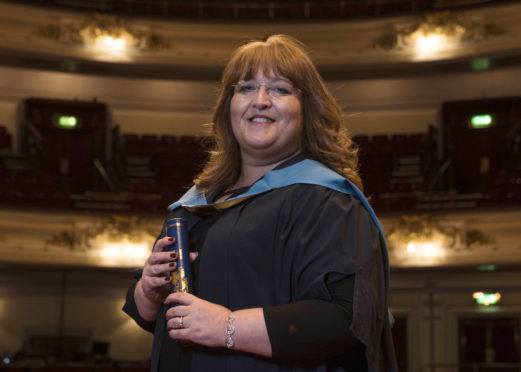Madam, – I was delighted to see the Courier note the 50th anniversary of the founding of the Open University, (The Courier, April 23) as perhaps not many know of the intimate connection between this “national treasure” and Dundee.
Founded in 1969 the OU is the biggest higher education institution in the UK, transforming many thousands of lives over the past 50 years.
However, I was not aware until recently that one of the founders and its first vice-chancellor was a distinguished Scottish scientist and a former pupil of Dundee High School – Walter Laing MacDonald Perry, Baron Perry of Walton.
Walter Perry was born in Dundee, son of Flora and Fletcher Perry, and educated at Ayr Academy, and the High School of Dundee.
He studied medicine at St Andrews University graduating with an MB ChB in 1943, his MD in 1948 and a DSc in 1958.
Between 1944 and 1946 he worked as a medical officer in the RAF and Nigeria.
He later worked as a scientist for institutions like the Medical Research Council. In particular he became an expert on polio. He developed his career at Edinburgh University as Professor of Pharmacology, later Dean of Medicine and vice-principal.
In 1969 plans developed to expand and democratise higher education by bringing in distance learning.
Walter Perry helped found the Open University, the world’s first ‘university of the air’ and then became its very first vice-chancellor, making that university into an effective academic institution and proving sceptics wrong.
He was mainly responsible for deciding that the Open University would not compromise on academic standards – he was determined that its qualifications should be of equal academic value to non-distance learning universities.
He later worked further to develop distance learning through the United Nations.
Perry had already been awarded an OBE in the 1957 New Year Honours, but was subsequently knighted in 1974.
He entered the House of Lords, being created a life peer with the title Baron Perry of Walton, named after Walton Hall, the site of the OU in Milton Keynes in Buckinghamshire, on February 9, 1979, later taking the SDP and Liberal Democrat whips, and served on the committee dealing with science and technology.
He kept working right up to his death in 2003.
It is wonderful to remember the roots of a fantastic institution, planted by another remarkable, charismatic, proactive and visionary Dundonian.
The High School’s unofficial motto is “Let Your Lives speak”. He certainly did that.
Dr John D Halliday.
Rector,
High School of Dundee.
Time to come clean on flaring
Madam, – Sepa’s response to the Mossmorran ethylene plant’s latest flaring event is unlikely to be of any comfort to local residents (“Flaring is ‘no cause for concern over air quality’, says Sepa” , The Courier, April 25).
It may be more useful to publish all relevant measurements of emissions, including pollutants and noise associated with this site, and how those measurements compare with both long and short term exposure limits. The Sepa website does not provide this information (nor does it appear to allow comparison of the site’s ‘flare consent’ with historical reality).
Given that prolonged episodes of ‘producing through the flare’ is generally a sign of ageing, unstable plant and/or poor process management, I imagine it would also be of interest to the local residents to know why Mossmorran continues to suffer from significant flaring events and what – exactly – is being done to provide a long term solution to the problem.
It is probably fair to say that, in the context of Mossmorran, neither ExxonMobil nor Sepa have enhanced their credibility as operator and regulator respectively. A clear, focused response to the flaring issue is long overdue.
Ian Davidson.
Brae Street,
Dunkeld.
European path to progress
Madam, – I was struck by the recent report from think tank, IPPR, on the need for the UK to become “more European” in its approach to public spending to end austerity.
The report found UK government spending amounts to 40.8% of GDP but the average stands at 48.9% for similar European countries. It noted the UK was ranked the lowest for inequality and was one of the lowest for poverty and child poverty rates.
It is increasingly clear the social devastation caused by the austerity agenda in the UK is too great and cannot go on. More than four million people a year are now using foodbanks. Homelessness has more than doubled. And poverty rates have been growing, with a fifth of the UK population, including one in three children, now living below the breadline.
There is now overwhelming evidence that austerity has done significant damage to our economy. Our neighbours in Europe have long embraced a less austere state that is more active in addressing social challenges.
Raising public services investment in the UK to 48% of GDP would mark a return to pre-2010 levels and spending on health, education and social security would increase by £1,800 per person annually, according to the analysis.
Of course these European countries also pay significantly higher taxes. But given they experience, on average, lower levels of poverty and inequality, and consistently outperform us in terms of health, education and life satisfaction, this may well be a price worth paying. Furthermore, contrary to predictions, this doesn’t appear to come at the expense of economic growth, or alongside particularly higher levels of debt.
We need a fundamental shift in our approach to investment to deliver high quality social and child care, a life-long education system, 21st Century healthcare and a properly funded benefits system.
The irony is while we may be leaving the EU, in other ways we must become ‘more European’.
Alex Orr.
Marchmont Road,
Edinburgh.










